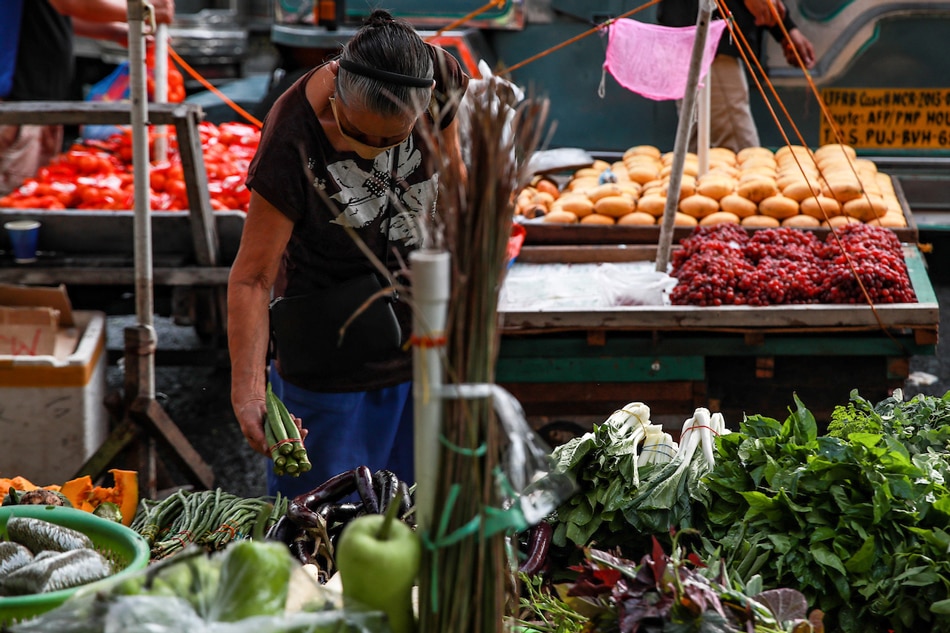Marcos tells WEF: PH economy to grow 'around 7 percent' in 2023 | ABS-CBN
ADVERTISEMENT

Welcome, Kapamilya! We use cookies to improve your browsing experience. Continuing to use this site means you agree to our use of cookies. Tell me more!
Marcos tells WEF: PH economy to grow 'around 7 percent' in 2023
Marcos tells WEF: PH economy to grow 'around 7 percent' in 2023
ABS-CBN News
Published Jan 18, 2023 04:51 PM PHT
MANILA —The Philippine economy is seen to grow "around 7 percent" this year, President Ferdinand Marcos, Jr. said, as he addressed delegates to the World Economic Forum in Davos, Switzerland.
MANILA —The Philippine economy is seen to grow "around 7 percent" this year, President Ferdinand Marcos, Jr. said, as he addressed delegates to the World Economic Forum in Davos, Switzerland.
During his opening remarks at the WEF's country strategy dialogue, Marcos cited the Philippines' "strong macroeconomic fundamentals" for the projected economic growth this year.
During his opening remarks at the WEF's country strategy dialogue, Marcos cited the Philippines' "strong macroeconomic fundamentals" for the projected economic growth this year.
“But for the Philippines, we project our economy to grow by around 7.0 percent in 2023," he told business and world leaders attending the prestigious forum in Davos, Switzerland.
“But for the Philippines, we project our economy to grow by around 7.0 percent in 2023," he told business and world leaders attending the prestigious forum in Davos, Switzerland.
"Our fiscal discipline, structural reforms and liberalization of key sectors instituted over the years have enabled us to withstand the negative shocks caused by the pandemic and succeeding economic downturns and map a route toward a strong recovery,” Marcos added.
"Our fiscal discipline, structural reforms and liberalization of key sectors instituted over the years have enabled us to withstand the negative shocks caused by the pandemic and succeeding economic downturns and map a route toward a strong recovery,” Marcos added.
ADVERTISEMENT
The Chief Executive also called on world leaders to "unwind any trade restrictions," noting that the country adheres to the World Trade Organization (WTO) reform.
The Chief Executive also called on world leaders to "unwind any trade restrictions," noting that the country adheres to the World Trade Organization (WTO) reform.
“We have seen inflation accelerating globally in recent months… We are mindful that while protectionist policies may be appealing, even necessary in the short term, there will ultimately be no long-term winners," he said.
“We have seen inflation accelerating globally in recent months… We are mindful that while protectionist policies may be appealing, even necessary in the short term, there will ultimately be no long-term winners," he said.
Marcos touted the country's efforts to boost economic recovery, which includes supporting localities, digitalization, connectivity in remote areas, and helping businesses become competitive through their entry into global markets.
Marcos touted the country's efforts to boost economic recovery, which includes supporting localities, digitalization, connectivity in remote areas, and helping businesses become competitive through their entry into global markets.
He also hoped more governments will engage with public-private partnerships.
He also hoped more governments will engage with public-private partnerships.
“The government also recognizes the importance of digitalization as a key driver for long-term economic growth and as a tool for economic transformation,” said Marcos.
“The government also recognizes the importance of digitalization as a key driver for long-term economic growth and as a tool for economic transformation,” said Marcos.
ADVERTISEMENT
Last December, the Development Budget Coordination Committee said GDP growth could hit the 6.5 percent to 7.5 percent target for 2022.
Last December, the Development Budget Coordination Committee said GDP growth could hit the 6.5 percent to 7.5 percent target for 2022.
However, it also said growth is likely to decelerate in 2023 to between 6 to 7 percent due to external headwinds such as the slowdown in major economies.
However, it also said growth is likely to decelerate in 2023 to between 6 to 7 percent due to external headwinds such as the slowdown in major economies.
The inflation forecast was also raised to a range of 3.7 to 4.7 percent, from the earlier 2 to 4 percent. This follows the uptick in the price of food and energy due to the Russia-Ukraine conflict and disrupted supply chains.
The inflation forecast was also raised to a range of 3.7 to 4.7 percent, from the earlier 2 to 4 percent. This follows the uptick in the price of food and energy due to the Russia-Ukraine conflict and disrupted supply chains.
Inflation in December last year hit 8.1 percent, the highest since November 2008, mainly due to the higher prices of select food items including onions and other vegetables.
Inflation in December last year hit 8.1 percent, the highest since November 2008, mainly due to the higher prices of select food items including onions and other vegetables.
Socioeconomic Planning Secretary Arsenio Balisacan had said protecting the purchasing power of Filipinos remains a government priority as food prices soar.
Socioeconomic Planning Secretary Arsenio Balisacan had said protecting the purchasing power of Filipinos remains a government priority as food prices soar.
— Job Manahan and Jess Fenol, ABS-CBN News
Read More:
economic growth
7 percent growth
Marcos says economic growth 7 percent
economic outlook philippines
Marcos
davos
ADVERTISEMENT
ADVERTISEMENT



